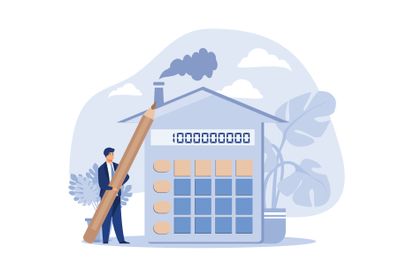Mortgage Calculator: Find Your Monthly Payment
Use our tool to easily calculate your monthly mortgage payment.
- (opens in new tab)
- (opens in new tab)
- (opens in new tab)
- Newsletter sign up Newsletter


Determining your monthly mortgage payment is essential, as it’s usually the largest recurring expense you’ll have to budget for. By using our mortgage calculator, you’ll be able to estimate how much your monthly mortgage payment will be.
With the calculator, you’ll be able to view your mortgage payment for a variety of scenarios - different home prices, down payment amounts, term and interest rates. Also try our new tool, in partnership with Bankrate, to compare mortgage rates available today.
How to use the mortgage calculator
Understandably, you may be struggling with determining just how much you’ll owe on your mortgage, as the mortgage payment calculation looks like this: M = P [ i(1 + i)^n ] / [ (1 + i)^n – 1]. However, with our mortgage calculator, you can forego all the complicated calculations and simply enter in a few pieces of information.

Sign up for Kiplinger’s Free E-Newsletters
Profit and prosper with the best of expert advice on investing, taxes, retirement, personal finance and more - straight to your e-mail.
Profit and prosper with the best of expert advice - straight to your e-mail.
First, you enter in the overall price of the home, if you’re buying, or the current value of your home if you’re refinancing. You’ll also include either the down payment, the cash you plan on paying upfront towards the home; or the amount of equity you have, which is the value of the home, minus what you owe on it.
Where it says “length of loan” you’ll enter in the term length. Typically, most mortgages are 30-year mortgages, but you can enter your desired term length to compare terms and decide which loan term length is right for you. You can then compare how different interest rates will affect your monthly payment. Using the mortgage calculator can also help you determine how much to put down on your home. While it's recommended to put down 20% to get the best rates, it's not necessary, and you can play with this number to see how it affects your mortgage rate.
Saving on your mortgage rate
Lenders consider many factors when determining the interest rate on your mortgage, including down payment, loan term and the price of the property. The biggest factor they take into consideration, however, is your credit score. Upping your credit score could potentially save you thousands of dollars on your home mortgage. The chart below, from MyFICO (opens in new tab), shows how much you can expect to pay depending on where your credit score stands, based on a 30-year fixed mortgage of $350,000.
| FICO Score | APR | Monthly Payment | Total Interest Paid |
|---|---|---|---|
| 760-850 | 6.173% | $2,138 | $419,505 |
| 700-759 | 6.395% | $2,188 | $437,725 |
| 680-699 | 6.572% | $2,229 | $452,381 |
| 660-679 | 6.786% | $2,278 | $470,251 |
| 640-659 | 7.216% | $2,380 | $506,638 |
| 620-639 | 7.762% | $2,510 | $553,724 |
Here are a few other ways that help you get a low mortgage rate.
- Increase your down payment: The higher your down payment, the less principal and less interest you'll have to pay over the life of the loan. You'll likely need a 20% down payment to get the best rates.
- Shop around: Because different lenders offer different rates, it's important to get at least three quotes when shopping for a mortgage in order to take advantage of the lowest rates.
- Consider an adjustable-rate mortgage (ARM): An ARM could be a good option for you, especially if you plan on selling your home sometime in the future. These mortgages offer fixed interest rates that are often lower than those for traditional mortgages for a set number of years. With this tool, you can see how much your monthly payments will be during the fixed period of an ARM, as well as when the introductory period expires. Once the fixed period is over, your mortgage rate can go up or down based on the market.

Erin pairs personal experience with research and is passionate about sharing personal finance advice with others. Previously, she was a freelancer focusing on the credit card side of finance, but has branched out since then to cover other aspects of personal finance. Erin is well-versed in traditional media with reporting, interviewing and research, as well as using graphic design and video and audio storytelling to share with her readers.
-
-
 Spending Cuts Could Trigger Deeper Slowdown: Kiplinger Economic Forecasts
Spending Cuts Could Trigger Deeper Slowdown: Kiplinger Economic ForecastsEconomic Forecasts Spending Cuts Could Trigger Deeper Slowdown: Kiplinger Economic Forecasts
By David Payne • Published
-
 Travel Demand and Delays to Soar, So Plan Ahead: Kiplinger Economic Forecasts
Travel Demand and Delays to Soar, So Plan Ahead: Kiplinger Economic ForecastsEconomic Forecasts Travel Demand and Delays to Soar, So Plan Ahead: Kiplinger Economic Forecasts
By Sean Lengell • Published

